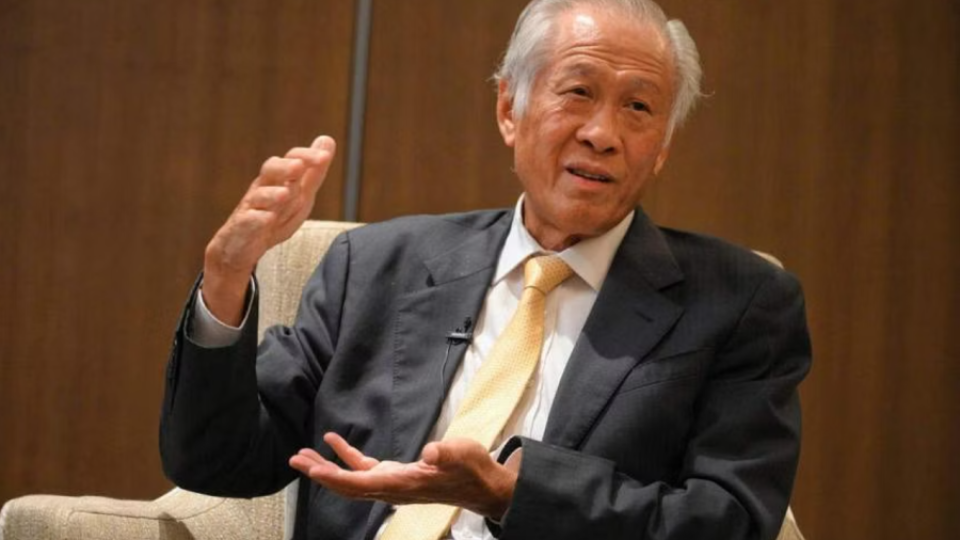June 5, 2023
SINGAPORE – The foremost priority for countries in the coming decade is to prevent physical conflict from breaking out in Asia, Singapore’s Defence Minister Ng Eng Hen said on Sunday.
Yet, while few would disagree that simultaneous conflicts in Europe and Asia would be catastrophic for an entire generation, “unfortunately the reality and trajectory of geopolitics diverges”, he said in a speech at the final panel discussion of the Shangri-La Dialogue.
Dr Ng pointed to a series of close shaves between the United States and China in the South China Sea and Taiwan Strait in recent days to show how unplanned incidents could occur which may precipitate a larger confrontation, as he reiterated the need for the two powers to have open channels of communication.
On Saturday, a Chinese warship came within 50m of an American destroyer in the Taiwan Strait, while just days earlier, a Chinese fighter jet flew directly in front of a US surveillance plane over the South China Sea.
Calling the US-China relationship central to the stability of Asia and the wider Indo-Pacific region, Dr Ng said communication channels, both formal and informal, are necessary to de-escalate and avoid conflict.
“The salient point is that such channels of communications must be built over time – it will be too late to start or activate them only in moments of crisis,” he said.
“Seasoned diplomats compare unfavourably the lines of communication between the US and Soviet Union in the Cold War with what exists today between the US and China, now at its ebb.”
It was less than a decade ago that the US and China had regular exchanges between their officials at all levels, said Dr Ng, who was joined on the panel by Australia’s Deputy Prime Minister Richard Marles and Cambodia’s Deputy Prime Minister Tea Banh.
Dr Ng cited how ministers from both sides used to meet yearly at the US-China Strategic and Economic Dialogue to discuss economic and security issues, while the two militaries would host each other’s leaders and also participate in joint war games.
These engagements have ceased, and that can only be detrimental to the region’s security, he said. The last strategic dialogue took place in 2016, while the two defence ministers last visited each other’s countries in 2018.
“Both the US and China have said that they do not want our countries, Asean countries, to take sides,” he said.
“But Asean member states, with a vivid recollection of great power rivalry in our pasts and the devastating consequences, we are acutely concerned that worsening relationships between these two powers, the US and China, will inevitably force difficult choices upon our individual states.”
Addressing a question from a member of the audience about Japan’s rising military spending, Dr Ng said Tokyo should continue to reassure its neighbours, including China, about its defence policy.
The most important thing Japan can do for stability in South-east Asia is to improve its relations with China and reassure its neighbours as it raises its defence spending, he added.
“I worry more about North-east Asia than I do the South China Sea,” Dr Ng said.
Elaborating in a wrap-up interview with reporters, Dr Ng noted that disputes in the South China Sea have been going on for years, but there are avenues for countries to de-escalate and deconflict and claimant states have been trying to find a common path.
“For North-east Asia, you have large powers: China, Japan, South Korea, and North Korea, a de facto nuclear power,” he said. “The fireworks are much larger, even if they are stored.”
By 2030, Japan’s military budget will be over US$60 billion (S$81 billion) – similar to France and more than what Australia will spend, he noted.
Japan may have been a very peaceful country since World War II, and given out a lot of aid, but it still has “unresolved animosities (that) are not far from the surface” with its neighbours, said Dr Ng.
“We’ve never been to this situation where Japan spends that much, and it will be good of them to pay attention to the constant reassurance of (its) Asean neighbours and China,” he said.
He added: “The better your relations with China, the more room you have to deal with some of these unresolved animosities (should they) float to the surface.”
Such reassurances can be made through continued engagement in multilateral settings such as the Shangri-La Dialogue, said Dr Ng.
He noted that Asean has, both through bilateral ties of individual members and collectively through the Asean Defence Ministers’ Meeting-Plus, sought to ensure there are platforms for confidence building and to pre-empt problems.
On Sunday, Dr Ng called on Timor-Leste President Jose Ramos-Horta and Estonian Prime Minister Kaja Kallas on the sidelines of the dialogue, capping off at least 20 bilateral meetings he had with counterparts over the weekend. He also met Mr Marles, who had called on Deputy Prime Minister Lawrence Wong at The Treasury on Saturday.
In his speech, he called on defence leaders to continue with dialogue to meet their peoples’ expectations of keeping them from harm’s way, even if progress at times seem painfully slow.
“What else do we have, if not words? Meeting like-with-like, simply escalates,” he said. “As leaders, we owe it to our people… to secure peace through dialogue.”


